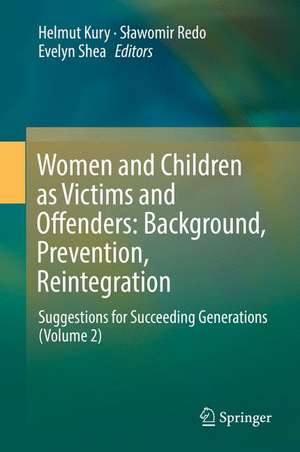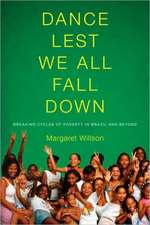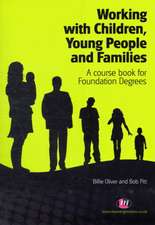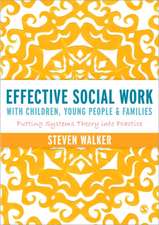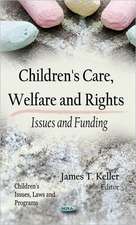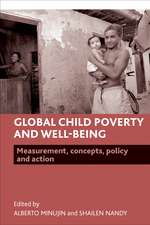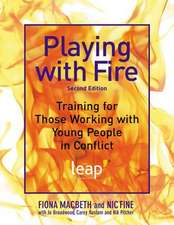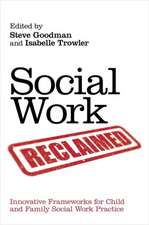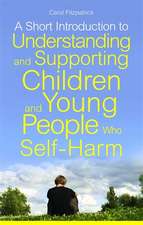Women and Children as Victims and Offenders: Background, Prevention, Reintegration: Suggestions for Succeeding Generations (Volume 2)
Editat de Helmut Kury, Sławomir Redo, Evelyn Sheaen Limba Engleză Hardback – iul 2016
Furthermore, it argues for a more humane and effective approach to countering delinquency and crime among future generations. In a world where development positively depends on the rule of law and the related investment security, two global trends may chart the course of development: urbanization and education. Urbanization will globalize the concepts of “justice” and “fairness”; education will be dominated by the urban mindset and digital service economy, just as a culture of lawfulness will. This work looks at crime prevention education as an investment in the sustainable quality of life of succeeding generations, and at those who pursue such crime prevention as the providers of much-needed skills in the educational portfolio. Adopting a reformist approach, this work collects articles with findings and recommendations that may be relevant to domestic and international policymaking, including the United Nations Studies and their educational value for the welfare of coming generations. The books address the relevant United Nations ideas by combining them with academic approaches. Guided by the Editors’ respective fields of expertise, and in full recognition of academic freedom and “organized scepticism”, it includes contributions by lawyers, criminologists, sociologists and other eminent experts seeking to bridge the gap between academic and policy perspectives, as appropriate, against the international background, including the United Nations developments.
The second volume opens with Part IV, which presents articles on different kinds of crime prevention. The effectiveness of punishment and, in particular, imprisonment is examined by contrasting it with alternative sanctions and the following questions are raised: Does harsh punishment have a crime preventive effect? What are the side effects of imprisonment on the offenders and their families? Are alternatives, such as restorative justice or mediation, more effective and cheaper? Part V outlines proactive strategies of crime prevention, e.g. for potential sex offenders or in the domain of internet crime. Part VI envisions a more peaceful and inclusive society, which would be realized by improving the protection of women and children in their everyday life, and easing the reintegration of those who have become offenders. The importance of the role played by the UN in formulating these goals is underlined. The volume concludes with an epilogue of the 70th President of the United Nations Economic and Social Council, Martin Sajdik, and a post scriptum of the editors.
p>
| Toate formatele și edițiile | Preț | Express |
|---|---|---|
| Paperback (2) | 771.56 lei 38-44 zile | |
| Springer International Publishing – 26 mai 2018 | 989.98 lei 3-5 săpt. | |
| Springer International Publishing – 31 mai 2018 | 771.56 lei 38-44 zile | |
| Hardback (2) | 799.19 lei 38-44 zile | +84.70 lei 4-10 zile |
| Springer International Publishing – 9 iun 2016 | 829.69 lei 3-5 săpt. | +84.70 lei 4-10 zile |
| Springer International Publishing – iul 2016 | 799.19 lei 38-44 zile |
Preț: 799.19 lei
Preț vechi: 1037.90 lei
-23% Nou
Puncte Express: 1199
Preț estimativ în valută:
152.92€ • 159.68$ • 126.28£
152.92€ • 159.68$ • 126.28£
Carte tipărită la comandă
Livrare economică 11-17 aprilie
Preluare comenzi: 021 569.72.76
Specificații
ISBN-13: 9783319284231
ISBN-10: 3319284231
Pagini: 920
Ilustrații: LXXXII, 860 p. 55 illus., 48 illus. in color.
Dimensiuni: 155 x 235 x 48 mm
Greutate: 1.66 kg
Ediția:1st ed. 2016
Editura: Springer International Publishing
Colecția Springer
Locul publicării:Cham, Switzerland
ISBN-10: 3319284231
Pagini: 920
Ilustrații: LXXXII, 860 p. 55 illus., 48 illus. in color.
Dimensiuni: 155 x 235 x 48 mm
Greutate: 1.66 kg
Ediția:1st ed. 2016
Editura: Springer International Publishing
Colecția Springer
Locul publicării:Cham, Switzerland
Public țintă
Professional/practitionerCuprins
Volume 2
Part IV: The role of crime prevention: Punishment – imprisonment - alternative sanctions.- Part V: Crime Prevention: Proactive Strategies.- Part VI: Final Discussion
Part IV: The role of crime prevention: Punishment – imprisonment - alternative sanctions.- Part V: Crime Prevention: Proactive Strategies.- Part VI: Final Discussion
Notă biografică
Helmut Kury, Professor at the University of Freiburg (Germany), and Senior Researcher at MPI Słavomir Redo, UN Senior Crime Prevention and Criminal Justice Expert and staff of the United Nations Office on Drugs and Crime; Visiting Lecturer/Privatdozent at the Law Faculty, University of Vienna (Austria) Evelyn Shea, Researcher, Zurich (Switzerland)
Textul de pe ultima copertă
This work compiles experiences and lessons learned in meeting the unique needs of women and children regarding crime prevention and criminal justice, in particular the treatment and social reintegration of offenders and serves as a cross-disciplinary work for academic and policy-making analyses and follow-up in developing and developed countries.
Furthermore, it argues for a more humane and effective approach to countering delinquency and crime among future generations. In a world where development positively depends on the rule of law and the related investment security, two global trends may chart the course of development: urbanization and education. Urbanization will globalize the concepts of “justice” and “fairness”; education will be dominated by the urban mindset and digital service economy, just as a culture of lawfulness will. This work looks at crime prevention education as an investment in the sustainable quality of life of succeeding generations, and at those who pursue such crime prevention as the providers of much-needed skills in the educational portfolio. Adopting a reformist approach, this work collects articles with findings and recommendations that may be relevant to domestic and international policymaking, including the United Nations Studies and their educational value for the welfare of coming generations. The books address the relevant United Nations ideas by combining them with academic approaches. Guided by the Editors’ respective fields of expertise, and in full recognition of academic freedom and “organized scepticism”, it includes contributions by lawyers, criminologists, sociologists and other eminent experts seeking to bridge the gap between academic and policy perspectives, as appropriate, against the international background, including the United Nations developments.The second volume opens with Part IV, which presents articles on different kinds of crime prevention. The effectiveness of punishment and, in particular, imprisonment is examined by contrasting it with alternative sanctions and the following questions are raised: Does harsh punishment have a crime preventive effect? What are the side effects of imprisonment on the offenders and their families? Are alternatives, such as restorative justice or mediation, more effective and cheaper? Part V outlines proactive strategies of crime prevention, e.g. for potential sex offenders or in the domain of internet crime. Part VI envisions a more peaceful and inclusive society, which would be realized by improving the protection of women and children in their everyday life, and easing the reintegration of those who have become offenders. The importance of the role played by the UN in formulating these goals is underlined. The volume concludes with an epilogue of the 70th President of the United Nations Economic and Social Council, Martin Sajdik, and a post scriptum of the editors.
Furthermore, it argues for a more humane and effective approach to countering delinquency and crime among future generations. In a world where development positively depends on the rule of law and the related investment security, two global trends may chart the course of development: urbanization and education. Urbanization will globalize the concepts of “justice” and “fairness”; education will be dominated by the urban mindset and digital service economy, just as a culture of lawfulness will. This work looks at crime prevention education as an investment in the sustainable quality of life of succeeding generations, and at those who pursue such crime prevention as the providers of much-needed skills in the educational portfolio. Adopting a reformist approach, this work collects articles with findings and recommendations that may be relevant to domestic and international policymaking, including the United Nations Studies and their educational value for the welfare of coming generations. The books address the relevant United Nations ideas by combining them with academic approaches. Guided by the Editors’ respective fields of expertise, and in full recognition of academic freedom and “organized scepticism”, it includes contributions by lawyers, criminologists, sociologists and other eminent experts seeking to bridge the gap between academic and policy perspectives, as appropriate, against the international background, including the United Nations developments.The second volume opens with Part IV, which presents articles on different kinds of crime prevention. The effectiveness of punishment and, in particular, imprisonment is examined by contrasting it with alternative sanctions and the following questions are raised: Does harsh punishment have a crime preventive effect? What are the side effects of imprisonment on the offenders and their families? Are alternatives, such as restorative justice or mediation, more effective and cheaper? Part V outlines proactive strategies of crime prevention, e.g. for potential sex offenders or in the domain of internet crime. Part VI envisions a more peaceful and inclusive society, which would be realized by improving the protection of women and children in their everyday life, and easing the reintegration of those who have become offenders. The importance of the role played by the UN in formulating these goals is underlined. The volume concludes with an epilogue of the 70th President of the United Nations Economic and Social Council, Martin Sajdik, and a post scriptum of the editors.
Caracteristici
Cross-disciplinary work intended for academic and policy-making analyses and follow-up in developing and developed countries Prepared by three Co-Editors involved in international criminal justice education Concentrates on “justice”/”fairness” issues which may have some global commonalities Argues for a more humane and effective approach to countering delinquency and crime among future generations?
